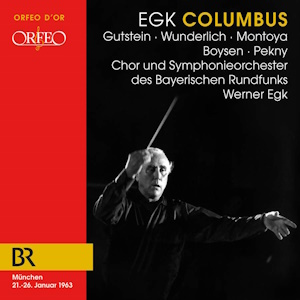
Werner Egk (1901-1983)
Columbus (1933) Ernest Gutstein (baritone) – Columbus
Fritz Wunderlich (tenor) – Ferdinand
Lia Montoya (soprano) – Isabella
Rolf Boysen and Romuald Pekny – Narrators
Bavarian Radio Chorus and Symphony Orchestra/Werner Egk
rec. 21-26 January 1963, Herkulessaal, Munich,
Orfeo C240032 [2 CDs: 91]
This 1963 studio broadcast recording has been available on CD for some ten years or more, but is now reissued apparently without any change to its contents. We still have the original booklet complete with notes on the score in German and English by Helga-Maria Palm, fairly detailed synopses (again in both German and English) and – marvellous to report – we still also have the complete text, although in German only. There never appears to have been an English translation of the libretto provided even with the original release, but the text (by the composer himself, drawn from historical documents) is remarkably straightforward and with the aid of the synopses it is not difficult even for the non-German speaker to keep abreast of what is going on.
Christopher Columbus has over the years attracted a good deal of attention from composers, although I must admit I am somewhat of a loss to explain exactly why. Yes, there is some musical mileage to be gained from a depiction of the ocean and the first sighting of a new continent – “eine neue Welt” as Columbus describes it here, although in reality he did much to try and dissuade his contemporaries from recognising the scale of his discoveries, insisting that the West Indies were just islands off the coast of Asia. Nor was the remainder of his career – a squalid combination of petty disputes at home and rampant proto-imperialism abroad – anything to add conspicuous glory to his reputation. Indeed quite the contrary. The best of the operatic and musical treatments of his life, that by Franchetti in his sprawling opera Christopher Columbus, only really comes to life in its depiction of the limitless Atlantic Ocean. Balada, in his two more recent operatic treatments of the character, is more concerned with the cultural influences of Columbus’s voyages than the voyages themselves. Egk, perhaps wisely, devotes much of his score to discussions and reviews of events than to the historical narrative, emphasising the horrors of colonialism with extensive use of chorus and two speakers. There are only three named solo roles of any substance, and these are restricted to a few individual numbers. The opera was originally designed for radio performance, which explains much of this formal structure; it only appears to have been actually reached the stage in 1942 when it was perhaps understandably not regarded as a success. But Egk struggled hard after the War to shed his former Nazi associations, and a revised version was given in Berlin in 1951, which is presumably the score as heard here; photographs in the booklet show a staged performance in Munich in 1960 with apparently the same cast. So this 1963 broadcast was certainly handsomely presented, and recorded over several days.
Probably the main reason for its continued presence in the catalogue, however, is the presence of Fritz Wunderlich in the cast as King Ferdinand. The reputation of Wunderlich after his early death has only continued to grow, and his relatively brief contribution to this recording clearly added a lustre to the event. The music provided for him does not sound particularly grateful to sing, but his honeyed tones add some glamour to what in other hands might turn into would-be heldentenor bawling; there is certainly no strain in the cruelly exposed upper register. Ernst Gutstein also acquits himself well in the title role despite some equally dangerous ascents into the upper reaches; he sounds generally heroic and visionary, and sustains a beautiful legato line in passages that could easily disintegrate into Bayreuth barking. Lia Montoya is less than ideally warm as Isabella, but she too avoids the danger of over-singing what is essentially a lyrical role. Romuald Pekny and Rold Boysen are characterful as the two narrators; for some reason two individuals are credited with the single role of the Herald. The chorus are somewhat ragged in places, but presumably the composer on the podium knew what he wanted in the passages which echo the idiom of Weill.
The music itself is not on the same level as Egk’s later Irische Legend, his treatment of Yeats’s The Countess Cathleen, which is the composer’s operatic masterpiece especially in the stunning original Salzburg performance conducted by George Szell with a superlative cast; but it is good to have it back in the catalogues again, and the mono radio broadcast sound is really quite acceptable. Moreover, if Orfeo can reissue their rare operatic treasures without stripping back their presentation to the bare minimum, why can’t other companies?
Paul Corfield Godfrey
Help us financially by purchasing from



Additional cast
Hans Herbert Fiedler (baritone) – 1st Councillor
Willy Ferenz and Wolfgang Anheisser (basses) – 2nd and 3rd Councillors
Max Pröbstl (bass) – Monk
Georg Pappas (bass) – Herald
Friedrich Lenz (tenor) – Cantor
Hans Stein, Kark Hanff and Eduard Linkers – Emigrants
Wolfried Lier, Til Kiwe, Siegurd Fitzek, Walter Holton – Soldiers
Peter Eschberg – Herald


















